Unit 10 I've had this bike for three years.Section A 3a~3c 课件 (共22张PPT)人教版八年级下册
文档属性
| 名称 | Unit 10 I've had this bike for three years.Section A 3a~3c 课件 (共22张PPT)人教版八年级下册 |
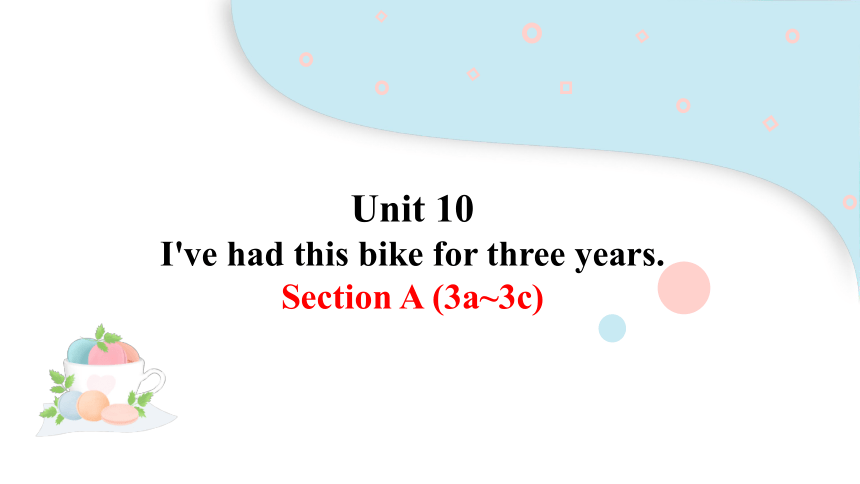
|
|
| 格式 | pptx | ||
| 文件大小 | 3.7MB | ||
| 资源类型 | 教案 | ||
| 版本资源 | 人教新目标(Go for it)版 | ||
| 科目 | 英语 | ||
| 更新时间 | 2024-12-13 00:00:00 | ||
图片预览

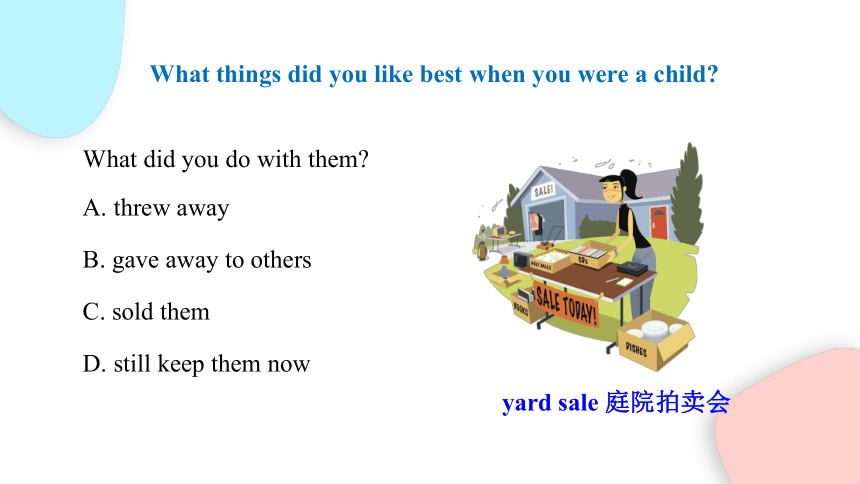
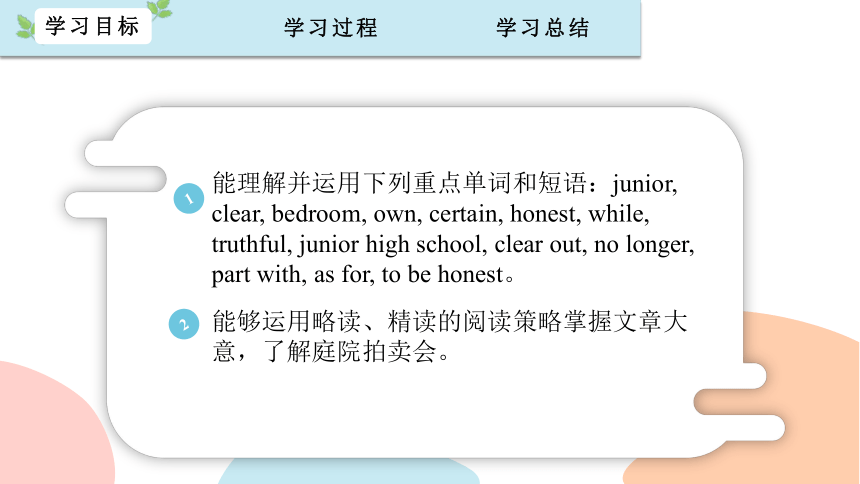
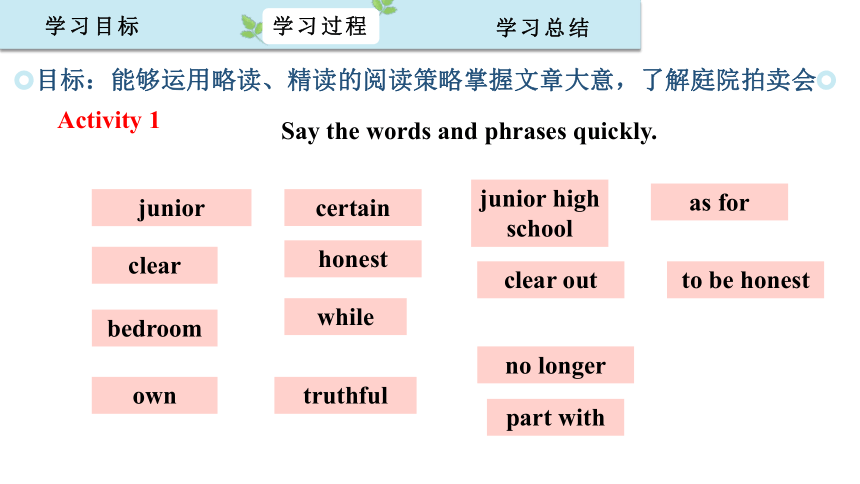

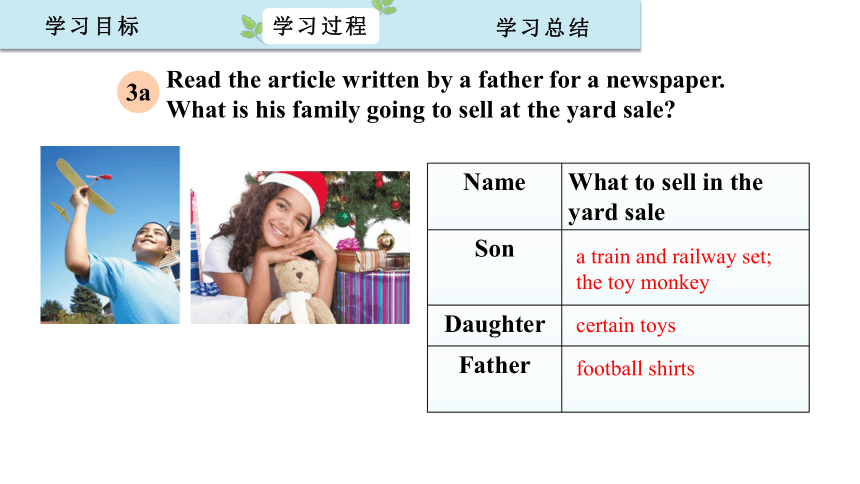
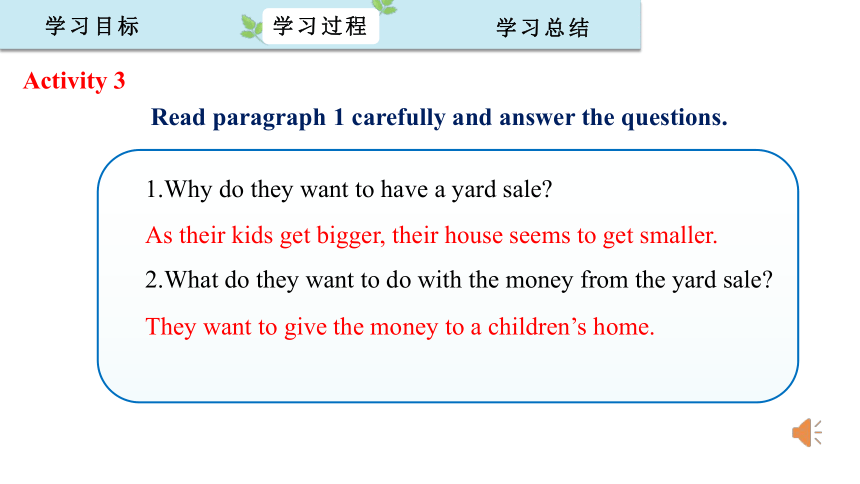
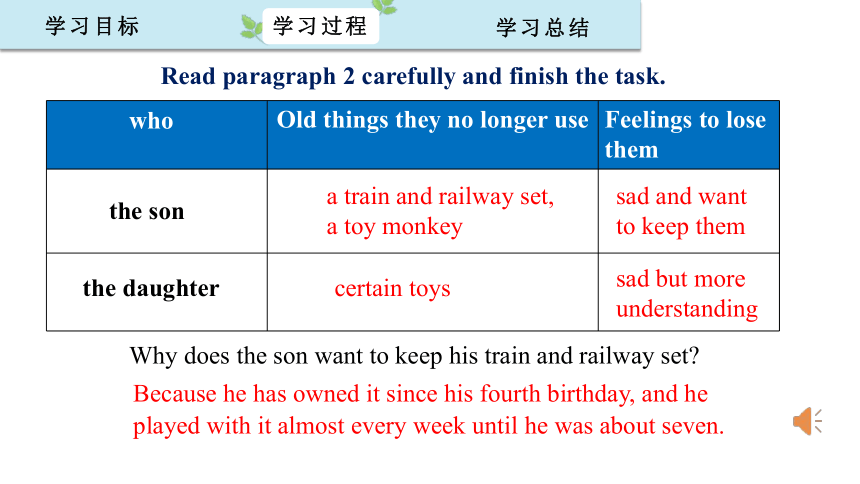
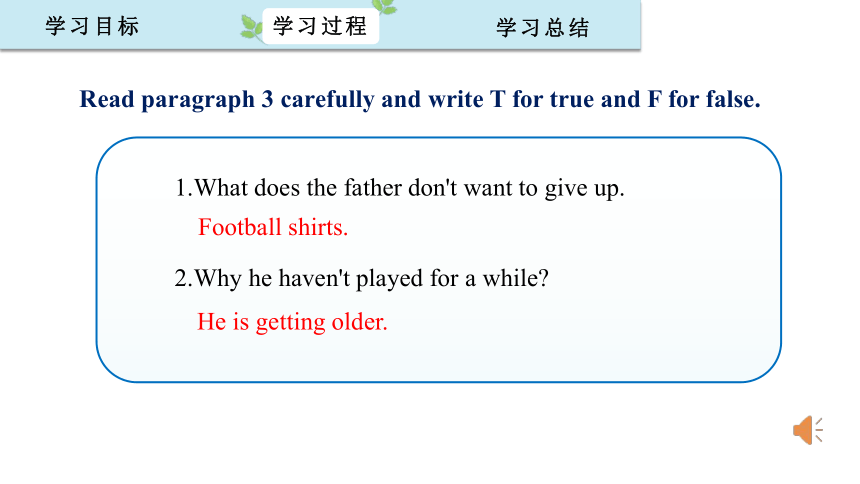
文档简介
(共22张PPT)
Unit 10
I've had this bike for three years.
Section A (3a~3c)
What things did you like best when you were a child
What did you do with them
A. threw away
B. gave away to others
C. sold them
D. still keep them now
yard sale 庭院拍卖会
1
能理解并运用下列重点单词和短语:junior, clear, bedroom, own, certain, honest, while, truthful, junior high school, clear out, no longer, part with, as for, to be honest。
2
能够运用略读、精读的阅读策略掌握文章大意,了解庭院拍卖会。
junior
truthful
to be honest
junior high school
honest
certain
clear
own
bedroom
clear out
no longer
Say the words and phrases quickly.
while
目标:能够运用略读、精读的阅读策略掌握文章大意,了解庭院拍卖会
Activity 1
as for
part with
Activity 2
Skim the passage and answer the quesions.
1.What is the article mainly about
The article is mainly about a family's yard sale.
2.Read and match.
Para 1
Para 2
Para 3
The girl’s and the boy’s feelings
The reason for a yard sale
The father’s feeling
Read the article written by a father for a newspaper. What is his family going to sell at the yard sale
3a
Name What to sell in the yard sale
Son
Daughter
Father
a train and railway set;
the toy monkey
certain toys
football shirts
Activity 3
Read paragraph 1 carefully and answer the questions.
1.Why do they want to have a yard sale
2.What do they want to do with the money from the yard sale
As their kids get bigger, their house seems to get smaller.
They want to give the money to a children’s home.
Read paragraph 2 carefully and finish the task.
Old things they no longer use Feelings to lose them
a train and railway set,
a toy monkey
sad and want to keep them
certain toys
sad but more understanding
who
the son
the daughter
Why does the son want to keep his train and railway set
Because he has owned it since his fourth birthday, and he played with it almost every week until he was about seven.
Read paragraph 3 carefully and write T for true and F for false.
1.What does the father don't want to give up.
2.Why he haven't played for a while
Football shirts.
He is getting older.
Read the article again and answer the questions.
3b
1. How can the old toys be useful again
2. Have you ever thought about having a yard sale to sell your things What would you do with the money you raise
They can be sold to the people who need them.
animal shelter
children’s home
Find the words or phrases in the article which can be replaced with the ones below and write them next to the words.
3c
lose— part with kids— _______
truthful— __________ many— ________
some time— ______ even though— _______
quickly— ______ older— ______
children
to be honest
a lot of
although
fast
bigger
a while
Activity 4
Work in groups. Find out some language points that you think are important and share their use with your classmates and give some examples.
Language point
1. We have already cleared out a lot of things from our bedrooms.
我们已经从卧室里清理了一些东西出来。
clear up 打扫; 清理; (天气)放晴; 澄清
clear out 清除; 赶走; 离开
clear off 消除; 摆脱; 走开; 消散
clear ... of 把 ... 从 ... 中清除
clear away 拿去,收去
clear v. 清理;清除 clear adj. 清澈的,晴朗的,明亮的
clear out 清理; 丢掉
[拓展]
Language point
2. We have decided to each sell five things that we no longer use.
each在此意为“各自;每个人”,在句中作同位语。例如:
(1)They each went there yesterday.
昨天他们每个人都去那里了。
(2)We each received a special gift from our teacher.
我们每个人都收到了老师给的一份特别的礼物。
(1)Each of us hopes to have free weekends.
我们每个人都希望有自由的周末。(作主语)
(2)Our teacher had a talk with each of us.
老师和我们每个人分别谈了话。(作宾语)
(3)Each man has his own name.
每一个人都有他自己的名字。(作定语)
each还可在句中作主语、宾语和定语。例如:
each和every都意为“每个”,但each指两者或两者以上,强调个体,可作主语、宾语、定语和同位语; every指三者或三者以上,强调整体和共性,只能作定语。例如:
(1)There are many trees on each side of the street.
街道两旁有很多树木。
(2)Every student needs to be careful with their studies.
每个学生都需要认真对待学习。
each和every的区别
另外,each 可以和of连用,而every 不可以;every前面可以有almost或nearly 修饰,each 不可以。例如:
(1)Each of us has an English-Chinese dictionary.
我们每个人都有一本英汉字典。
(2)Almost every person knows the news.
几乎每个人都知道了这个消息。
3. We have decided to each sell five things that we no longer use.
no longer相当于not…any longer,是一个表示时间的状语,和延续性动词连用。 通常放在行为动词的前面;和be动词连用时,放在系动词后面;
同义短语:no more=not …any more“不再”
e.g. (1) 他再也不住在这了。
He no longer lives here.=He doesn’t live here any longer.
(2) 这位农民不再种果树了。
The farmer no more plants fruit trees.
= The farmer doesn’t plant fruit trees any more.
4. My daughter was more understanding, although she also felt sad to part with certain toys.
e.g. (1) 我爱我的狗,决不愿和它分离。
I love my dog and I would never part with him.
(2) 请先读一下这个再交钱。
Please read this before parting with your money.
[拓展] part除了作动词外,还可作名词,表示“部分,参与”等。常用短语:part of...“……的一部分”,take part in“参与,参加”。
part用作动词时,既可作及物动词,也可作不及物动词,常构成短语part with“放弃,交出(尤指不舍得的东西)”。
5. My daughter was more understanding, although she also felt sad to part with certain toys.
常用结构:be certain to do sth.肯定要做某事
be certain of/about sth. 对某事确定、有把握
be certain of doing sth. 有把握做某事
be certain + that 从句 一定……
certain adj. 意为“某种; 某事; 某人”。
[拓展] certain形容词,意为“确实的,无疑的”。其副词形式certainly = sure = of course表示“当然”。
6. As for me, I did not want to give up my football shirts, but, to be honest, I have not played for a while now.
honest 为形容词,意为“诚实的; 老实的”。反义词为dishonest “不诚实的”。to be honest意为“说实在的, 说实话”,等同于honestly。经常单独使用, 作插入语,用逗号与句子隔开。类似的表达还有to tell the truth “老实说,说实话”。
as for意为“至于,就……而言,涉及,提到(某人某事)”,通常位于句首,引出下面的话题,as for后接名词/代词/动名词。
Finish the mind map then retell the passage according to the mind map.
We want to have a 3.________________.
Yard Sale
The reason
The son
The daughter
The writer
The children are 1.________________.
The house seems to 2.________________.
We’ll give the money to 4.________________.
He was quite 5.________________.
He wanted to keep a 6.________________set and his 7.________________.
She was more 8.________________.
She felt 9. to part with certain toys.
He wanted to keep his 10.________________.
He is getting 11.________________.
growing up fast
get smaller
yard sale
children's home
sad
train and railway
toy monkey
understanding
sad
football shirts
older
Unit 10
I've had this bike for three years.
Section A (3a~3c)
What things did you like best when you were a child
What did you do with them
A. threw away
B. gave away to others
C. sold them
D. still keep them now
yard sale 庭院拍卖会
1
能理解并运用下列重点单词和短语:junior, clear, bedroom, own, certain, honest, while, truthful, junior high school, clear out, no longer, part with, as for, to be honest。
2
能够运用略读、精读的阅读策略掌握文章大意,了解庭院拍卖会。
junior
truthful
to be honest
junior high school
honest
certain
clear
own
bedroom
clear out
no longer
Say the words and phrases quickly.
while
目标:能够运用略读、精读的阅读策略掌握文章大意,了解庭院拍卖会
Activity 1
as for
part with
Activity 2
Skim the passage and answer the quesions.
1.What is the article mainly about
The article is mainly about a family's yard sale.
2.Read and match.
Para 1
Para 2
Para 3
The girl’s and the boy’s feelings
The reason for a yard sale
The father’s feeling
Read the article written by a father for a newspaper. What is his family going to sell at the yard sale
3a
Name What to sell in the yard sale
Son
Daughter
Father
a train and railway set;
the toy monkey
certain toys
football shirts
Activity 3
Read paragraph 1 carefully and answer the questions.
1.Why do they want to have a yard sale
2.What do they want to do with the money from the yard sale
As their kids get bigger, their house seems to get smaller.
They want to give the money to a children’s home.
Read paragraph 2 carefully and finish the task.
Old things they no longer use Feelings to lose them
a train and railway set,
a toy monkey
sad and want to keep them
certain toys
sad but more understanding
who
the son
the daughter
Why does the son want to keep his train and railway set
Because he has owned it since his fourth birthday, and he played with it almost every week until he was about seven.
Read paragraph 3 carefully and write T for true and F for false.
1.What does the father don't want to give up.
2.Why he haven't played for a while
Football shirts.
He is getting older.
Read the article again and answer the questions.
3b
1. How can the old toys be useful again
2. Have you ever thought about having a yard sale to sell your things What would you do with the money you raise
They can be sold to the people who need them.
animal shelter
children’s home
Find the words or phrases in the article which can be replaced with the ones below and write them next to the words.
3c
lose— part with kids— _______
truthful— __________ many— ________
some time— ______ even though— _______
quickly— ______ older— ______
children
to be honest
a lot of
although
fast
bigger
a while
Activity 4
Work in groups. Find out some language points that you think are important and share their use with your classmates and give some examples.
Language point
1. We have already cleared out a lot of things from our bedrooms.
我们已经从卧室里清理了一些东西出来。
clear up 打扫; 清理; (天气)放晴; 澄清
clear out 清除; 赶走; 离开
clear off 消除; 摆脱; 走开; 消散
clear ... of 把 ... 从 ... 中清除
clear away 拿去,收去
clear v. 清理;清除 clear adj. 清澈的,晴朗的,明亮的
clear out 清理; 丢掉
[拓展]
Language point
2. We have decided to each sell five things that we no longer use.
each在此意为“各自;每个人”,在句中作同位语。例如:
(1)They each went there yesterday.
昨天他们每个人都去那里了。
(2)We each received a special gift from our teacher.
我们每个人都收到了老师给的一份特别的礼物。
(1)Each of us hopes to have free weekends.
我们每个人都希望有自由的周末。(作主语)
(2)Our teacher had a talk with each of us.
老师和我们每个人分别谈了话。(作宾语)
(3)Each man has his own name.
每一个人都有他自己的名字。(作定语)
each还可在句中作主语、宾语和定语。例如:
each和every都意为“每个”,但each指两者或两者以上,强调个体,可作主语、宾语、定语和同位语; every指三者或三者以上,强调整体和共性,只能作定语。例如:
(1)There are many trees on each side of the street.
街道两旁有很多树木。
(2)Every student needs to be careful with their studies.
每个学生都需要认真对待学习。
each和every的区别
另外,each 可以和of连用,而every 不可以;every前面可以有almost或nearly 修饰,each 不可以。例如:
(1)Each of us has an English-Chinese dictionary.
我们每个人都有一本英汉字典。
(2)Almost every person knows the news.
几乎每个人都知道了这个消息。
3. We have decided to each sell five things that we no longer use.
no longer相当于not…any longer,是一个表示时间的状语,和延续性动词连用。 通常放在行为动词的前面;和be动词连用时,放在系动词后面;
同义短语:no more=not …any more“不再”
e.g. (1) 他再也不住在这了。
He no longer lives here.=He doesn’t live here any longer.
(2) 这位农民不再种果树了。
The farmer no more plants fruit trees.
= The farmer doesn’t plant fruit trees any more.
4. My daughter was more understanding, although she also felt sad to part with certain toys.
e.g. (1) 我爱我的狗,决不愿和它分离。
I love my dog and I would never part with him.
(2) 请先读一下这个再交钱。
Please read this before parting with your money.
[拓展] part除了作动词外,还可作名词,表示“部分,参与”等。常用短语:part of...“……的一部分”,take part in“参与,参加”。
part用作动词时,既可作及物动词,也可作不及物动词,常构成短语part with“放弃,交出(尤指不舍得的东西)”。
5. My daughter was more understanding, although she also felt sad to part with certain toys.
常用结构:be certain to do sth.肯定要做某事
be certain of/about sth. 对某事确定、有把握
be certain of doing sth. 有把握做某事
be certain + that 从句 一定……
certain adj. 意为“某种; 某事; 某人”。
[拓展] certain形容词,意为“确实的,无疑的”。其副词形式certainly = sure = of course表示“当然”。
6. As for me, I did not want to give up my football shirts, but, to be honest, I have not played for a while now.
honest 为形容词,意为“诚实的; 老实的”。反义词为dishonest “不诚实的”。to be honest意为“说实在的, 说实话”,等同于honestly。经常单独使用, 作插入语,用逗号与句子隔开。类似的表达还有to tell the truth “老实说,说实话”。
as for意为“至于,就……而言,涉及,提到(某人某事)”,通常位于句首,引出下面的话题,as for后接名词/代词/动名词。
Finish the mind map then retell the passage according to the mind map.
We want to have a 3.________________.
Yard Sale
The reason
The son
The daughter
The writer
The children are 1.________________.
The house seems to 2.________________.
We’ll give the money to 4.________________.
He was quite 5.________________.
He wanted to keep a 6.________________set and his 7.________________.
She was more 8.________________.
She felt 9. to part with certain toys.
He wanted to keep his 10.________________.
He is getting 11.________________.
growing up fast
get smaller
yard sale
children's home
sad
train and railway
toy monkey
understanding
sad
football shirts
older
同课章节目录
- Unit 1 What's the matter?
- Section A
- Section B
- Unit 2 I'll help to clean up the city parks.
- Section A
- Section B
- Unit 3 Could you please clean your room?
- Section A
- Section B
- Unit 4 Why don't you talk to your parents?
- Section A
- Section B
- Unit 5 What were you doing when the rainstorm came
- Section A
- Section B
- Review of Units 1-5
- Unit 6 An old man tried to move the mountains.
- Section A
- Section B
- Unit 7 What's the highest mountain in the world?
- Section A
- Section B
- Unit 8 Have you read Treasure Island yet?
- Section A
- Section B
- Unit 9 Have you ever been to a museum?
- Section A
- Section B
- Unit 10 I've had this bike for three years.
- Section A
- Section B
